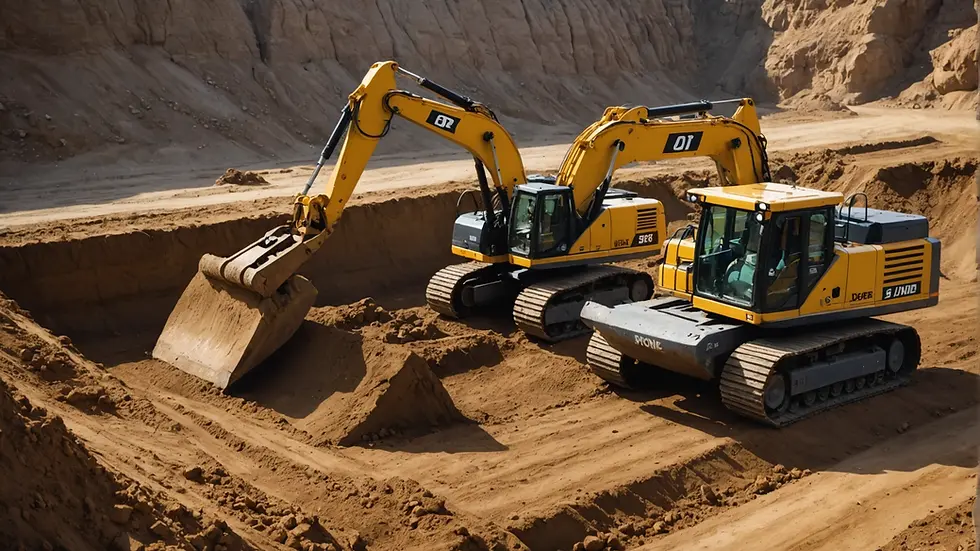Uncovering the Future: The Evolution of Smart Excavation Techniques
- PT PEP
- Nov 3, 2024
- 4 min read
In recent years, the construction and excavation industries have seen remarkable changes driven by smart technologies. As cities grow and infrastructure expands, the demand for efficient, precise excavation methods has skyrocketed. This blog post takes a closer look at smart excavation techniques, the technological transformation of traditional processes, and the benefits these innovations bring to construction projects.
Understanding Smart Excavation
Smart excavation combines advanced technologies, such as Artificial Intelligence (AI), Machine Learning, Geographic Information Systems (GIS), and the Internet of Things (IoT), into the excavation process. These tools enable real-time data collection, analysis, and decision-making, leading to better efficiency and lower costs.
Transforming to smart excavation isn't just about new tools; it requires a shift in culture regarding planning, executing, and managing projects. As more construction companies grow aware of these innovations, they are increasingly adopting smart excavation methods.
The Role of Technology in Excavation
1. Automation and Robotics
Automation has significantly improved efficiency and safety on construction sites. Robots now handle repetitive tasks like digging and grading. For instance, advanced excavators equipped with automation features minimize human error, boost productivity, and allow workers to focus on more complex tasks.
A noteworthy example is the use of autonomous excavators, which can operate without direct human control. These machines detect obstacles and adjust movements on the fly. In a trial, autonomous excavators reduced project timelines by as much as 30 percent compared to traditional methods, showcasing their potential for efficiency.
2. GPS and Geographic Information Systems (GIS)
GPS technology has transformed excavation with accurate site mapping and real-time tracking of equipment. When combined with GIS, excavation teams can analyze the terrain, identify potential problems, and make informed decisions before starting a project.
By knowing soil types and infrastructure locations, companies can prevent costly mistakes. For example, a study found that projects using GPS and GIS technology experienced a 25 percent reduction in unexpected delays due to the early identification of utility lines.
3. Data Analytics and Artificial Intelligence
Data is key in modern excavation practices. Companies gather extensive information, which can be analyzed using data analytics and AI to optimize processes. By examining project data, teams can identify trends, foresee challenges, and make necessary adjustments.
For instance, predictive analytics can help forecast the need for equipment, ensuring machinery is on-site when required. A construction firm that implemented AI for project management reported a 20 percent reduction in resource waste and improved efficiency.

4. IoT and Real-Time Monitoring
The Internet of Things (IoT) connects devices to share data seamlessly. In excavation, IoT enables the real-time monitoring of equipment and environmental factors. By placing sensors across job sites, construction teams can track aspects such as soil moisture and temperature.
This real-time data helps operators adjust techniques, leading to enhanced efficiency and reduced downtime. One project that utilized IoT saw a 15 percent improvement in daily productivity due to better equipment management and fewer interruptions.
Benefits of Smart Excavation Techniques
1. Increased Efficiency
Smart excavation techniques lead to faster and more precise project completion. Automation and real-time data help streamline workflows, allowing workers to focus on higher-skilled tasks while machines handle the more repetitive aspects of excavation.
2. Cost Savings
While investing in smart technology may have an initial cost, the long-term savings are substantial. By reducing errors and labor costs, advanced technologies can lower overall project expenses. For example, construction projects employing smart excavation techniques can see cost reductions of up to 30 percent over traditional methods.
3. Enhanced Safety
Safety remains a top priority in construction. Smart excavation contributes to safer work sites by reducing human error and providing real-time data on conditions. Automation takes over high-risk tasks, allowing workers to avoid potentially dangerous situations. For instance, sites that implemented smart technologies reported a 40 percent reduction in accidents.
4. Environmental Impact
Green building practices are becoming increasingly essential in construction. Smart excavation techniques help lessen the industry's environmental footprint by minimizing waste and optimizing resources. For example, careful project planning can result in a 20 percent decrease in resource consumption and less disturbance to local ecosystems.
Challenges and Considerations
Despite numerous advantages, transitioning to smart excavation does come with challenges.
1. Initial Investment
Integrating smart technologies can be a significant financial commitment. Upgrading equipment, training employees, and ensuring system interoperability can take time and resources. However, companies often find that the long-term advantages outweigh initial costs.
2. Skilled Labor Shortage
As technology evolves, so does the demand for skilled workers. Many companies face difficulties in finding personnel trained to operate advanced machinery and interpret data systems. Investing in employee education and training programs is essential for successfully implementing smart excavation.
3. Resistance to Change
Some professionals in construction may hesitate to adopt new technologies. Getting buy-in from these individuals requires time, education, and clear examples of the benefits that smart excavation can offer.
Embracing a Smart Future
The evolution of smart excavation techniques signals a significant shift in the construction industry. By adopting automation, GPS, AI, and IoT, companies can improve efficiency, reduce costs, enhance safety, and lessen environmental impact.
As technology continues to evolve, excavation processes are expected to become more advanced, fundamentally changing infrastructure development. For those ready to adapt and invest in these technologies, the benefits are substantial, creating a smarter, more sustainable future for the industry. Africa, for instance, has seen a 50 percent increase in project efficiency through the adoption of smart excavation methods in recent years. The excavation sector isn’t just uncovering soil but is also paving the way for innovative building practices.


Comments